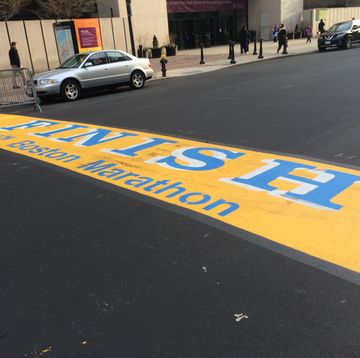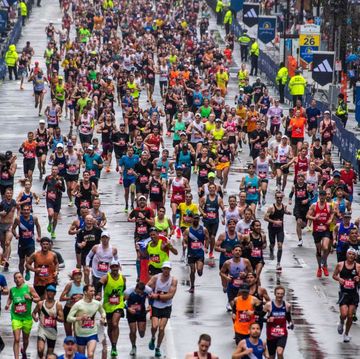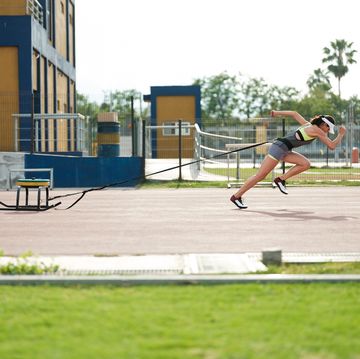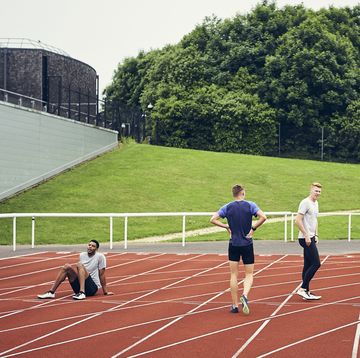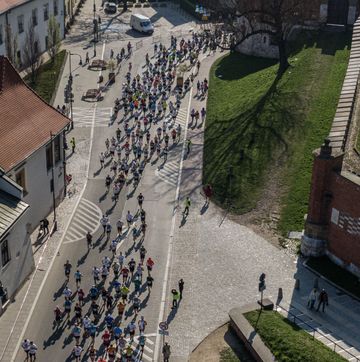Theresa Hailey has been dreaming of qualifying for the Olympic Marathon Trials from the day she joined her club, a couple of years after she graduated from college. For the next 15 months, she built up her base, put in high-volume speed and tempo sessions unlike anything she'd needed in college, and whittled away at her half marathon and marathon times. Finally, this spring, she felt ready to make a full-fledged attempt at the Olympic Trials “B” standard (2:43:00). She got an elite seed for the Eugene Marathon and set out to see how many 6:13 miles she could run.
The answer turned out to be a disappointing 14 or 15. She was perfectly on pace at the half marathon mark, but faded significantly by mile 18 and was even farther off at mile 24. She finished in 2:49:23.
But on a day when many of the other elite women ended up in tears (no American made the 2:43 standard), Hailey was ecstatic. She missed her goal, but ran a big personal record, scored a surprise top-five finish, and was almost immediately plotting her next assault on 2:43:00.
“I have a tendency to find the positives in everything I do,” Hailey says, “and when it was apparent it wasn't going to come from qualifying, it had to come from somewhere else—like getting a PR. Even a one-second PR would make me happy.”
From a mental health standpoint, Hailey might as well have won the Olympics. “[Her response] is extraordinarily healthy, productive, and satisfying,” says Jeffery Simons, a sports psychologist at California State University at East Bay, who has worked with elite athletes in several sports, including distance running.
It’s also simply not what most of us do. We get down on ourselves for not achieving our goals. All too often, in fact, we demand more even when we achieve our goals, wondering if we might have done better had we set the bar a bit higher. Alan Webb, who holds the American record for the mile, refers to this as the never-satisfied syndrome. “[It] is common among runners,” he says, “especially high-level runners.”
Partly, that’s because there’s a confusion between satisfaction and complacency, something most competitive runners want to avoid.
“I am either thinking I could have been a little tougher, could have raced a little smarter, or could have been more or less conservative,” says Ryan Vail, a 2:10:57 marathoner who is also no slouch on the track, with 5,000-meter and 10,000-meter PRs of 13:28.11 and 27:44.05. “There has never been a race where I have decided I got 100 percent out of myself, mentally and physically. I am assuming that day will never come, either.”
But just as Hailey notes that any PR, even by a single second, is reason for celebration, there’s a difference between perpetually beating yourself up and Vail's desire to improve. Not only does the former mean that someday you'll look back on your career and realize you were never happy, but always striving for too much can be counterproductive. Yes, it can be a key element to success, but “it is the main cause of most injuries—and then lack of success,” Webb says.
Being too self-critical can also isolate you from needed support. Bob Williams, a Portland, Oregon-based coach, notes that what he wants is for his runners to enjoy and appreciate what they are able to do. “It's hard to coach someone who is never satisfied,” he says.
One of the big traps for runners, Simons says, is thinking the only thing that matters is the result. He analogizes it to the difference between watching a basketball game and only caring about the score. The fun part of watching the game is the experience of living through it, he says. “I can read the score in the paper.”
Cruel Sport
When we race, of course, we are the game and what’s needed is to shift from thinking only about the outcome to focusing on the drama and experience of the entire event: from training through race-day preparation, strategy, tactics, and everything else that goes into a race.
In doing that, Simons says, it’s good to recognize that we have chosen a sport that's a little bit cruel. In basketball, you either win or lose and there are myriad paths to either option. In bowling, it’s possible to roll a perfect game. In running, you’re up against a clock whose minutes and seconds can be subdivided into such tiny units that the difference between breaking three hours in the marathon and coming up a second short is a mere 0.009 percent.
We need to shift from seeing each race as a punishing and awful test that we can’t possibly ace to focusing on the race experience. “You can still try to achieve something, but the achievement is taking what you've gotten from training and appreciating the drama and the narrative of the particular race,” Simons says.
Shift from outcome-oriented thinking to mastery-oriented thinking: a realization that you are the runner, not the clock.
“It’s always great to have a marker, like, ‘Yes, I made 80 minutes,’ or ‘Yes, I made a qualifying time.’ But if that's the only thing you’re after, you’re probably going to be disappointed,” Simons says.
Tom Cotner, distance coach of Seattle’s Club Northwest, asks his athletes to assess their races afterward, mile by mile, in writing. “You say what worked and what didn’t, and what sorts of things do I need to work on in order to improve,” he says. He urges his runners to keep these evaluations in a racing journal, so they can remind themselves of what strategies and tactics were effective for them.
Cotner particularly remembers one elite woman who liked to send him long emails describing her races. “One day I got a five- or six-paragraph recounting of the race, and she never mentioned two things: her time or her place,” he says. “She was so into the racing part of it that those things were secondary.”
This type of mental shift, however, is difficult for runners who tend toward perfectionism. “It's okay to be a little obsessed, trying to get everything right and taking care of all the loose ends,” Simons says. “What we're talking about is neurotic perfectionism. A neurotic perfectionist wants things to be truly perfect, sparkling, and fantastic. Anything less is awful.”
This, he says, is why so many runners aren’t happy even with big PRs. “As soon as the perfectionist sees that something [more] might have been possible,” he says, “it is shameful not to have achieved it.”
Ironically, this mindset can actually make you slower. Perfectionists don't do as well because some part of them knows that perfection is impossible. That creates a dissonance in the brain. “They get so worried about the absence of perfection that they will not do what they need to do,” Simons says.
Do the Work
But you can also get in trouble by thinking too positively.
There are many studies showing that certain types of positive thinking, especially visualization, can improve performance, particularly in skill sports. But a more recent line of research, spearheaded by Gabriele Oettingen, a professor of psychology at New York University and author of Rethinking Positive Thinking, has found that too much positive thinking can get in your way.
Oettingen's work began with a surprise result published in 1991 in Cognitive Therapy and Research, in which she and a colleague found that dieters who most strongly fantasized about success were the ones least likely to succeed. Subsequent studies found similar results for people seeking other goals, whether they were getting good grades in school, landing good jobs after graduation, improving their love lives, or recovering from hip replacements.
One reason the dreamers often failed, she says, is that they tended to invest so much of their effort into positive-thinking their way to success that they forgot to do the real work. That, she wrote in a 2014 article in the New York Times “Sunday Review,” “fools our minds into perceiving that we've already attained our goal, slackening our readiness to pursue it.”
Runners, of course, aren't likely to get lazy and forget to train. Most of us realize that the only way to achieve our dream is by hard work.
But Oettingen isn't done. She's not a runner, but she is an expert at goal achievement. The first stages, she says, are to identify your wish, then let yourself fantasize about the outcome you desire, because such fantasies do have a role in propelling yourself toward it. But then you should change gears and look at the obstacles standing between you and your dream. That way, she says, you will understand what you must do to overcome them.
She calls this process “mental contrasting,” by which she means contrasting your dreams with the obstacles you will need to overcome. Doing so, she argues, will force you to deal with the reality of whether you have the time, energy, or talent to actually do what you want—a discovery that can save you a lot of grief later on.
“If people would do that,” she says, “they would understand what they really want, and that would give them more satisfaction than blindly running after more and more.”
For runners, what this ultimately translates to is realistic goal setting. “[It's] the key to not being disappointed,” Vail says.
It's also important to have backup goals. Vail always has an “A” goal and a “B” goal. “The 'A' is always quite lofty but not unrealistic,” he says, “while the 'B' is the bare minimum that I would be satisfied with.”
For example, in this year's U.S. championships, his “A” goal was to be in the top three and go to the world championships. His “B” was to be in the top six. He was fifth. “I don't usually talk about my ‘B’ goal,” he says. “I just keep it in the back of my mind and try to focus on the ‘A.’ “ But he notes, “I hit my ‘B’ much more often than I hit my ‘A.’”
If you take this approach, you have to realize that missing the “A” goal isn't a failure. “If it's not worth striving for and falling short, then it’s probably not worth striving for,” Simons says.
Studies of history’s great achievers, he adds, show that the one common denominator—besides achieving great things—was the tremendous number and scope of their failures. This is not commonly reported or understood.
In part, this is because you often learn more from a failure than you do from a success. “I think logically,” says Hailey, who is by profession an engineer. “It's like writing a [computer] program or giving a presentation. There will always be things you miss, and things you learn from that make you better prepared next time.”
But also, it's because sometimes you just want to throw yourself out there after a lofty goal. In a reception after this year's Grandma's Marathon, 1980s marathon great Dick Beardsley noted that some of his greatest successes came from doing exactly this…even if on other occasions he failed miserably.
If you are faced with such a decision, give yourself the freedom to risk without fear. As Cotner says, “Go for it. If it doesn't happen, there’s no failure.”



